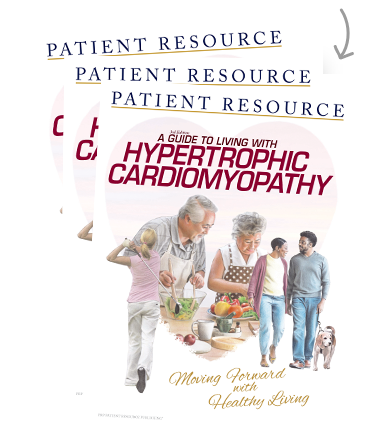Risk Factors & Symptoms
Recognizing the signs that may point to HCM
The symptoms of HCM can be difficult to distinguish from other conditions and may be confused with asthma, chronic obstructive pulmonary disease (COPD), panic attacks, poor fitness or sleep apnea. In some cases, people with HCM can go a long time without realizing they have symptoms. It can also be hard to differentiate HCM from other heart-related problems in older patients. As a result, diagnosing HCM may take some time.
Unlike some other heart conditions, HCM is not preventable because it is inherited from one or both of your parents. The main risk factor for HCM is having a parent with the mutated gene, and only a single copy of the mutated gene is needed to cause the disease. HCM can run in families without the family's awareness. Signs that it may run in your family include the following:
- A family history of certain conditions, including:
- Cardiomyopathy or an enlarged or weak heart
- Heart failure or sudden cardiac arrest (SCA)
- Recurrent syncope (fainting)
- Sudden death
- Unexplained death from drowning or a single-vehicle crash
- A pacemaker or atrial fibrillation on its own before age 65
- Any type of skeletal muscle disease, such as Duchenne muscular dystrophy
- list item
- Long-term high blood pressure or alcoholism
- Coronary heart disease or heart attack
- A viral infection that inflames heart muscle
- Diabetes or severe obesity
- Diseases that damage the heart
If you have any relatives with the above conditions, it may be time to discuss whether genetic testing would be helpful. Genetic testing helps determine whether you have inherited a mutation that increases your risk for developing certain types of disease — even if you have not been diagnosed.
Common Symptoms
One person with HCM may have different symptoms than another person with the same disease. The symptoms can also show up at any age, develop slowly and range from mild to severe. There is no list of symptoms used to definitively diagnose HCM, but some of the most common include the following:
- Having trouble exercising over time
- Fatigue
- Chest pain, especially after a heavy meal or when being active
- Shortness of breath or trouble breathing, especially when being active
- A fluttering or pounding feeling in the chest (palpitations), which may be due to an abnormal heart rhythm (arrhythmia)
- Feeling dizzy or lightheaded
- Fainting when being more active
- Heart murmurs (unusual sounds linked with heartbeats)
- Muscle pains
- Brain fog
In some cases, there are no recognizable symptoms. Whether a person has symptoms or not, HCM can be challenging to diagnose. It is important to tell your doctor about any symptoms you experience and provide regular updates to your medical team. Keep track of your symptoms, note when they occur, how long they last and whether anything makes them better or worse. This information is valuable to your doctor.
Complications of HCM
HCM can lead to other health problems:
- Mitral valve problems, including blocked blood flow that prevents the mitral valve from closing correctly or mitral valve regurgitation (backward blood leakage), which can increase symptoms.
- A weakened and ineffective heart muscle.
- Atrial fibrillation (AFIB). A thicker heart muscle and abnormal heart cells can cause changes in your heart’s electrical system that result in AFIB (fast or irregular heartbeats). AFIB can also lead to blood clots, stroke or other heart complications.
- Arrhythmias. Irregular heartbeats are common in HCM. Examples include ventricular tachycardia (arising from the ventricles) or atrial fibrillation.
- Sudden cardiac arrest (SCA) and, in rare cases, sudden cardiac death (SCD). Younger patients with HCM are at higher risk of experiencing SCD than older patients. However, SCD is rare.
- Heart failure. This occurs when the heart is not pumping hard enough or may not fill well enough. As a result, there is insufficient blood to meet the body’s needs.
- Blocked blood flow.
- Heart block. This occurs when the normal electrical signal travels too slowly to the ventricles or is partially or completely blocked.
The symptoms of heart failure
Heart failure is a potential complication of having HCM. In this case, “failure” does not mean your heart suddenly stops. Rather, heart failure starts slowly and gets worse over time. It occurs when your heart muscle is injured and cannot pump enough blood throughout your body.
Heart attack and high blood pressure are two common risk factors for heart failure. Your heart may become weak and unable to pump blood (systolic heart failure), or stiff and unable to fill with blood (diastolic heart failure). Both can lead to a buildup of extra fluid and other symptoms.
Symptoms of heart failure may be subtle and show up at a later stage after the heart becomes really weak. Heart failure shares some of the same symptoms of HCM and may cause you to experience the following:
- Frequent coughing, coughing up pink, blood-tinged sputum or a dry, hacking cough when lying down
- Swollen feet, ankles, legs or abdomen from a buildup of fluid
- A greater need to urinate at night
- Nausea and lack of appetite
- Cold legs and arms
- Trouble concentrating



